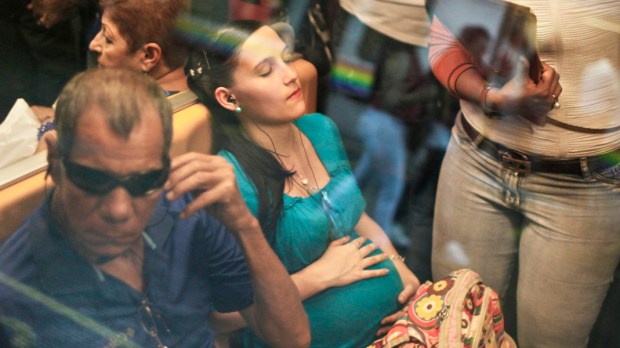During all of my many pregnancies, I unfailingly encountered the awkward scenario of walking into a room (or church, or a doctor’s waiting room) to find no available chairs. In my first pregnancy, I saw this as a personal affront and consequently had a strong emotional reaction when I was not offered a seat. I’d feel hurt or angry and remain standing, passive-aggressively casting accusatory glances at any seated male within eye contact, while fortifying my martyr complex.
In later pregnancies, though, things got more complicated. When I was pregnant with my third and constantly carrying or chasing an active toddler, I felt guilty accepting offered seats because I knew I would hardly sit in them at all. Sometimes I would accept and then try and force the toddler to sit still on my lap so the man who gave me his seat didn’t feel offended. Other times I would thank him profusely but refuse the seat, explaining that I would hardly be using it. Usually they seemed understanding and sat back down, but sometimes they would insist and simply remain standing until I finally gave up, pulled the toddler into my lap, and sat down.
Every woman who has experienced pregnancy can recount tales like this. It’s such a common phenomenon that transport companies in London have launched a “Baby on Board” badge program that provides buttons for expecting mothers to wear identifying their pregnancy in the hopes that it will inspire fellow commuters to offer up their seats. Predictably, the BBC article covering the initiative focused largely on the idea of feminism as the driving force behind men failing to give their seats up for pregnant women:
Gogglebox star and social etiquette expert Mary Killen can remember a time when it was “the custom that men always made their seat available to women and older people. But now I think they’ve been frightened by feminists biting their heads off.” Ms Killen, who writes an advice column for The Spectator magazine, says denial among seated passengers is not a reasonable excuse. “It’s usually clear when someone needs a seat as they are either looking for [one] or trying to make eye contact. People should offer.” What about the risk of social stigma at offering your hard-earned pew to someone who isn’t in need? “It’s worth getting your head snapped off, because these little acts of recognition of other humans are of such value.”
I’ve been pregnant a lot, y’all. If you do the math, I’ve spent a little over 4 years of my life pregnant — and I have never once had a man refuse to give me a seat because he was bitter toward feminists. Nor have I ever seen a pregnant woman — or any woman for that matter — bite a man’s head off for offering her a seat. I’m not saying it doesn’t happen, I’m just saying the people who turn a simple act of social kindness into a political battleground are few and far between, and they’ve got bigger problems than refusing to give or take a seat.
It was more common to see people absorbed by phones, or teenage boys who clearly hadn’t been taught to offer seats, or young men who either didn’t know they should offer pregnant women seats or didn’t care.
By my fifth and last pregnancy, I was exhausted by these interactions. The whole thing seemed ridiculous by then, like some kind of social farce we were doomed to keep repeating — and with four kids in tow, I didn’t have time or patience to play passive-aggressive games. Instead, if I was exhausted and needed to sit, I just asked someone. They almost always hadn’t noticed me and practically leapt out of their seat, tripping over their apologies. Only rarely did anyone refuse, and when it did happen another man was already on his feet, offering me a chair and glaring fiercely at the one who had refused. And those times when I was offered a seat and didn’t want to sit? I just said, “no, thank you.” No explanations, no guilt, no negotiations — just a polite but firm refusal with a simple dash of gratitude. And you know what I unfailingly heard in return? “Okay, let me know if you change your mind!” Always with a friendly smile.
The thing is, simple human kindness is just that — simple. It doesn’t have to be complicated with messy notions of gender equality or social resentment, and if it is mixed up with those things it likely isn’t kindness at all, just something that looks like kindness. We don’t have to approach the world and each other with trepidation, trying to psychoanalyze every word and action. We can just be human beings and take each other’s words and actions at face value. If someone doesn’t offer you a seat, just ask for one. Likely they’re absorbed (as we all are) by their phones, and will happily give up their seat. And if they don’t, move on and take that rudeness as a lesson for yourself and one to pass on to your children. And vice versa — if you happen to see someone who looks like they need a seat, just offer. The worst they can do is be offended, and that’s their failing, not yours.
The world is already enough of a battleground. Let’s start reclaiming the simplicity of human kindness by keeping social interactions simple, and being kind.

